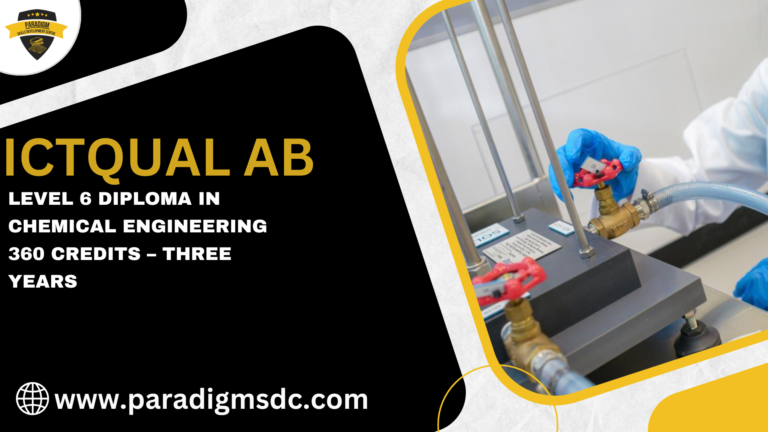If you’re looking to advance your career in chemical engineering, the ICTQual Level 3 Diploma in Chemical Engineering (60 Credits) is the perfect opportunity for you. This diploma program, designed to be completed in just 3 months, equips students with the essential knowledge and skills to thrive in the chemical engineering industry. Whether you’re looking to upskill or pursue a career change, this qualification is an excellent choice.
The ICTQual Level 3 Diploma in Chemical Engineering is a vocational qualification aimed at individuals who want to specialize in chemical engineering. This diploma is highly recognized in the industry, offering students a comprehensive understanding of chemical processes, engineering principles, and the key tools used in the field. With 60 credits, the program ensures that students gain the necessary academic depth and practical insights to apply their knowledge effectively in the workplace.
Graduates of the ICTQual Level 3 Diploma in Chemical Engineering are well-prepared to take on various roles within the chemical engineering sector. This includes positions such as process engineers, safety officers, and technical consultants. Additionally, the diploma can serve as a stepping stone toward higher-level qualifications and further specialization in chemical engineering fields.
The ICTQual Level 3 Diploma in Chemical Engineering is a well-respected qualification that offers a fast, efficient way to enter the chemical engineering field. With 60 credits and the flexibility to complete the program in just 3 months, it is an excellent choice for anyone looking to make a quick yet impactful transition into the industry.
If you’re ready to take the next step in your career or are looking to enter the exciting field of chemical engineering, the ICTQual Level 3 Diploma in Chemical Engineering (60 Credits) is the ideal choice. With fast-paced, comprehensive learning and a clear focus on industry-relevant skills, this qualification offers everything you need to succeed.
Study Units:
- Introduction to Chemical Engineering Principles
- Process Control and Instrumentation
- Fluid Mechanics and Transport Phenomena
- Chemical Reaction Engineering
- Safety, Health, and Environmental Considerations in Chemical Engineering
- Project Management and Communication in Chemical Engineering
Learning Outcomes:
Below are the learning outcomes for each of the study units in the ICTQual Level 3 Diploma in Chemical Engineering program:
1. Introduction to Chemical Engineering Principles
- Demonstrate an understanding of basic chemical engineering processes, including material and energy balances.
- Apply mass flow calculations to solve chemical engineering problems.
- Utilize fundamental thermodynamics to analyze chemical systems.
- Develop skills to perform basic chemical engineering calculations and design tasks.
2. Process Control and Instrumentation
- Identify and describe key components of process control systems used in chemical engineering.
- Analyze and apply control loops in process systems to optimize chemical production.
- Evaluate the role of instrumentation in monitoring and controlling chemical processes.
- Use control theory to design and troubleshoot chemical engineering systems.
3. Fluid Mechanics and Transport Phenomena
- Explain the principles of fluid dynamics and their applications in chemical engineering processes.
- Apply fluid flow calculations in various chemical engineering systems, including pipes and reactors.
- Understand and calculate heat and mass transfer in chemical processes.
- Analyze transport phenomena (e.g., diffusion, convection) and their impact on chemical engineering designs.
4. Chemical Reaction Engineering
- Explain the fundamentals of chemical reaction kinetics and mechanisms.
- Design and analyze chemical reactors, including both batch and continuous systems.
- Evaluate the effects of catalysts on reaction rates and process efficiency.
- Apply principles of reaction engineering to improve process safety, productivity, and sustainability.
5. Safety, Health, and Environmental Considerations in Chemical Engineering
- Recognize and apply safety regulations and protocols in chemical engineering practices.
- Evaluate and mitigate health risks in chemical plant environments.
- Assess the environmental impact of chemical processes and recommend sustainable practices.
- Identify and manage hazards associated with the handling, storage, and disposal of chemicals.
6. Project Management and Communication in Chemical Engineering
- Demonstrate effective project management skills, including planning, scheduling, and budgeting for chemical engineering projects.
- Apply leadership and teamwork principles to manage engineering projects in a collaborative setting.
- Communicate technical information clearly and effectively to stakeholders, both in written and oral formats.
- Utilize case studies and project-based learning to apply theoretical knowledge to real-world chemical engineering problems.







